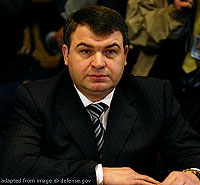Shady dealing, sex scandals and Russia’s defense crisis

(Moscow News – themoscownews.com – Anna Arutunyan – November 12, 2012)
When Anatoly Serdyukov, reportedly clad in a bathrobe and slippers, opened the door to a police unit raiding his former employee’s apartment, it was the tipping point for Russia’s beleaguered defense minister.
But it wasn’t the only reason by far why the catastrophically unpopular defense minister was sacked last week in the biggest military reshuffle of President Vladimir Putin’s tenure. Analysts say Putin is raising morale by replacing Serdyukov with the popular former Emergency Situations Minister Sergei Shoigu, but Shoigu will nevertheless inherit all of Serdyukov’s problems.
On the plus side, Shoigu boasts phenomenal popularity.
“He works hard, he makes others work hard,” Alexander Shchepilov, a former Emergency Situations Ministry officer who worked closely with Shoigu during the 1990s and continues collaborating with the ministry in the private sector, told The Moscow News. “People would follow him then, and they will follow him now.”
According to the Levada polling center, trust ratings have consistently placed Shoigu third, after Putin and Prime Minister Dmitry Medvedev.
Shchepilov is convinced Shoigu could handle the pressure, but the new defense minister could be finding himself in a high-stakes political game beyond his control.
After all, even Serdyukov, in a sign of the challenges he was facing, was rumored to have asked to resign last spring something that the Defense Ministry then denied.
“[Shoigu] has trust now, but tomorrow it will be gone, once he learns that he cannot rearm the Army,” Alexander Konovalov, President of the Institute of Strategic Analysis, told The Moscow News.
Serdyukov’s efforts to push through an ambitious reform and modernization program clashed with a perennial problem of inefficiency and corruption within the military industrial complex, analysts said. “He was an absolute civilian, who didn’t have any idea about the challenges the army is facing,” Shchepilov said.
Will Shoigu, a man who gets the job done, be able to succeed where Serdyukov failed?
“No, it’s impossible,” Konovalov said. “If he’s got a task to stock the army with modern, quality weapons, then he won’t be able to do it. The military industrial complex isn’t equipped to produce high quality weapons in the necessary quantity it’s equipped to [embezzle] money.”
One of the reasons a civilian tax manager like Serduykov was brought in to the Defense Ministry was to rein in rampant corruption and embezzlement. But at the end of the day, the former furniture sales manager was hardly able to make a dent in the graft.
By 2011, officials cited that up to 20 percent of the military budget was eaten away by corruption, kickbacks and fraudulent contracts. Troops, meanwhile, were still getting poor quality equipment and weapons, according to scathing comments made by chief military prosecutor Sergei Fridinsky to Rossiiskaya Gazeta, a government publication, in May 2011.
Cherchez la femme?
Serdyukov’s real crime, according to one compelling theory cited by Reuters, was crossing the family of Viktor Zubkov, a key Putin ally.
In 2000, Serdyukov married Zubkov’s daughter, Yulia, a union that helped propel his career. But Serdyukov’s alleged affair with Yevgeniya Vasilyeva, his neighbor and former employee, whose apartment was being raided as part of an investigation into the corrupt sell-off of military assets costing the state some $100 million, broke the bounds of loyalty so valued in the inner circle, a source close to the government told Reuters.
Yet other analysts point out that the bathrobe and slippers incident could not have been enough.
According to Alexander Konovalov, the raid in the apartment of Serdyukov’s neighbor and alleged mistress could not have been an accident. “The defense minister is a man who holds the nuclear suitcase,” Konovalov told The Moscow News. “In order for investigators to go there, someone had to order it.”
Konovalov believes Putin reluctantly caved to pressure from the military industrial complex to sack Serdyukov. He also appointed Shoigu to avoid other, more ambitious contenders, like Dmitry Rogozin, a former nationalist party leader who returned from a stint as NATO envoy in December 2011 to become Deputy Prime Minister for Defense.
Rogozin has been the key lobbying force behind the military industrial complex and in particular Uralvagonzavod, a Soviet-era tank manufacturer. Around the same time as his promotion in December 2011, a group of Uralvagonzavod workers pledged, in a televised Q & A with the presidential candidate, to stand behind Putin and take on Moscow’s protesters if necessary. Soon, the plant walked away with a $2 billion state order to modernize tanks for the Russian army.
In spring 2012, Rogozin was also widely cited as a possible replacement for Serdyukov, if he were to be sacked.
The succession question
Shoigu’s appointment has some analysts wondering if the Defense Minister post might not be a launching pad for the presidential chair or the post of PM.
“In case it is necessary for the ruling class or for Putin himself to hold an early election, this [Shoigu] is the only person from the elite who can be sold to the public,” liberal commentator Andrei Piontkovsky, who was recently elected into the oppositionist Coordination Council, said in an interview to Finam radio last week.
“Putin may be finding himself shopping around for a new prime minister soon,” Mark Galeotti, a Russian security expert who chairs the Center for Global Affairs at New York University, said. “Shoigu is a fairly solid [candidate].”
When and if the inner circle starts looking for someone to replace Putin, “that’s when they’ll be looking to Shoigu,” Galeotti said.
But Shchepilov, who remembers Shoigu as a man of action, whom others will follow, doubts that his popularity will play a factor.
“When was the last time they listened to what the people want?” He said. “When they made Medvedev president?”
